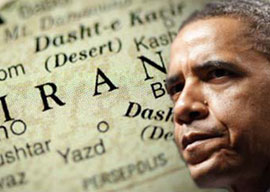
July 30, 2013

In his second term, Richard Nixon had Watergate, but also the rescue of Israel in the Yom Kippur War.
In his second term, Ronald Reagan had Iran-Contra, but also a treaty eliminating U.S. and Soviet missiles in Europe, his “tear-down-this-wall” moment in Berlin and his lead role in ending the Cold War.
In his second term, Bill Clinton had Monica, but also came close to a peace treaty between Ehud Barak and Yasser Arafat.
Obama’s second-term scandals—IRS, Benghazi, wiretapping The Associated Press and Fox—are in the low-kiloton range compared to the resignation of Nixon or the impeachment of Clinton.
And as Obama is going to get nada from a Republican House on guns, amnesty, cap-and-trade or a second stimulus, he should look for his legacy—as Nixon, Reagan and Clinton did—to foreign policy.
Two opportunities beckon. First, the mirage—a Middle East peace. Essential to any treaty, however, is a withdrawal of Israeli “settlers” from the West Bank, a sharing of Jerusalem, Palestinian acceptance of Israel as a “Jewish state” and Arab repudiation of the “right of return.”
Good luck. Bibi Netanyahu, who calls Jerusalem our “eternal capital” and Judea and Samaria our ancient lands, is not going to divide Jerusalem or uproot Jewish settlers from the West Bank—not when he opposed their removal from Gaza by Ariel Sharon.
Bibi will not do it, cannot, if he wants his Likudnik coalition to survive. And Obama lacks the clout in Congress or this capital city to force Bibi to do anything he does not wish to do.
Hence Obama’s legacy hopes lie not in Israeli-Palestinian peace talks in Washington this week, but in what is happening in Iran—the inauguration of the president who replaces Mahmoud Ahmadinejad.
Hasan Rouhani was elected with 51 percent of the vote by the constituency that voted against Ahmadinejad in 2009. His triumph was due to his endorsement by former presidents Ali Akbar Hashemi Rafsanjani and Mohammad Khatami. Both had been kept off the ballot by Ayatollah Khamenei.
Rouhani is a founding father of the Islamic Republic and was a close ally of Ayatollah Khomeini. But he was elected on a pledge to revive the economy, get sanctions lifted, and re-engage with the West.
He won on a promise of better times for the Iranian people and an end to Iran’s isolation.
Yet the only way he can achieve these goals is to come to terms with Obama on Iran’s nuclear program. And as he was once Iran’s lead negotiator on that program, Rouhani knows exactly what is required.
Despite the decades of acrimony between us, the basic elements of a Washington-Tehran deal are there.
Iran wants its rights under the Non-Proliferation Treaty (NPT)—to peaceful nuclear research and nuclear power—recognized by the United States. And it wants U.S.-UN sanctions lifted.